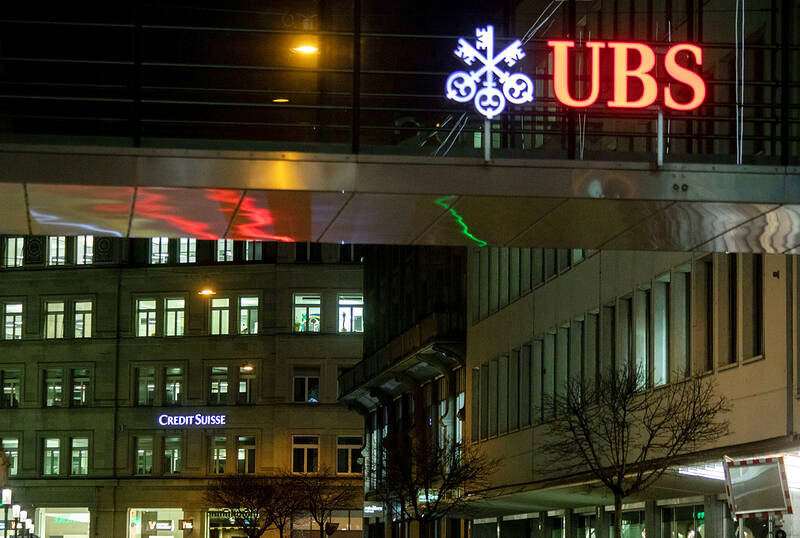UBS Group AG and Credit Suisse Group AG are opposed to a forced combination, even as scenario planning for a government-led tie-up continues, people with knowledge of the matter said.
UBS would prefer to focus on its own wealth-centric standalone strategy and is reluctant to take on risks related to Credit Suisse, the people said, asking not to be identified as the deliberations are private.
Its smaller rival is seeking time to see through its turnaround after winning a liquidity backstop from the central bank, they said.

Photo: Bloomberg
Credit Suisse on Thursday arrested a collapse in investor confidence after winning a 50 billion Swiss francs (US$54 billion) credit line from the Swiss National Bank. That came after the Swiss lender had appealed to authorities for a public show of support following an unprecedented slump in the shares.
With investors jittery after the collapse of Silicon Valley Bank, comments by Credit Suisse’s largest shareholder that it was not willing to invest more in the bank were enough to provoke a deep sell-off on Wednesday.
UBS and Credit Suisse see a takeover as a potential measure of last resort, given the significant hurdles and overlap from such a transaction, the people said.
The government and the lenders are running through a whole range of scenarios, and it remains to be seen which additional steps would be taken beyond the liquidity backstop.
UBS and Credit Suisse declined to comment. The Swiss government did not immediately respond to e-mailed request for comment.
TAKEOVER INEVITABLE?
JPMorgan Chase & Co analysts led by Kian Abouhossein are among those saying the bank’s troubles are most likely to end in its takeover, probably by UBS.
A tie-up with its larger rival was also one option discussed in talks between Credit Suisse and Swiss authorities recently, people with knowledge of the matter said earlier this week.
Analysts at Keefe, Bruyette & Woods, in a note headed “sticking plaster” after the liquidity backstop, said the new measures buy Credit Suisse time, but a breakup is the most likely solution.
Morningstar also said a breakup of the bank would be an alternative to having another capital increase, having raised about US$4 billion from investors late last year.
Credit Suisse could also pursue a breakup of the lender, with the wealth management business going to UBS or another buyer, the Swiss unit being separated as a new entity to protect Swiss deposits, and the asset management and investment banking operations being divested or separated, two of the people said.
IMPACT ON PUBLIC
Still, objections to a potential deal extend beyond the two firms. The Swiss government is also concerned about job losses that would result from a combination, and would prefer a Swiss solution if possible to the situation and is most concerned about protecting local businesses and deposits, two people said.
Some of the wealth clients might also oppose a merger with UBS, given the overlap in accounts.
A full-blown combination would be a reversal of years of too-big-to-fail rules and would raise antitrust concerns in many business lines. Switzerland has also generally favored the idea of two global banks whose rivalry has been one of the key drivers of the competitiveness of Switzerland’s financial services sector. A deal could also lead to higher capital requirements.
UBS chief executive officer Ralph Hamers on Wednesday declined to answer any “hypothetical” questions about Credit Suisse and only said he was “focused on our own strategy.”

To many, Tatu City on the outskirts of Nairobi looks like a success. The first city entirely built by a private company to be operational in east Africa, with about 25,000 people living and working there, it accounts for about two-thirds of all foreign investment in Kenya. Its low-tax status has attracted more than 100 businesses including Heineken, coffee brand Dormans, and the biggest call-center and cold-chain transport firms in the region. However, to some local politicians, Tatu City has looked more like a target for extortion. A parade of governors have demanded land worth millions of dollars in exchange

Hong Kong authorities ramped up sales of the local dollar as the greenback’s slide threatened the foreign-exchange peg. The Hong Kong Monetary Authority (HKMA) sold a record HK$60.5 billion (US$7.8 billion) of the city’s currency, according to an alert sent on its Bloomberg page yesterday in Asia, after it tested the upper end of its trading band. That added to the HK$56.1 billion of sales versus the greenback since Friday. The rapid intervention signals efforts from the city’s authorities to limit the local currency’s moves within its HK$7.75 to HK$7.85 per US dollar trading band. Heavy sales of the local dollar by

Taiwan Semiconductor Manufacturing Co’s (TSMC, 台積電) revenue jumped 48 percent last month, underscoring how electronics firms scrambled to acquire essential components before global tariffs took effect. The main chipmaker for Apple Inc and Nvidia Corp reported monthly sales of NT$349.6 billion (US$11.6 billion). That compares with the average analysts’ estimate for a 38 percent rise in second-quarter revenue. US President Donald Trump’s trade war is prompting economists to retool GDP forecasts worldwide, casting doubt over the outlook for everything from iPhone demand to computing and datacenter construction. However, TSMC — a barometer for global tech spending given its central role in the

An Indonesian animated movie is smashing regional box office records and could be set for wider success as it prepares to open beyond the Southeast Asian archipelago’s silver screens. Jumbo — a film based on the adventures of main character, Don, a large orphaned Indonesian boy facing bullying at school — last month became the highest-grossing Southeast Asian animated film, raking in more than US$8 million. Released at the end of March to coincide with the Eid holidays after the Islamic fasting month of Ramadan, the movie has hit 8 million ticket sales, the third-highest in Indonesian cinema history, Film